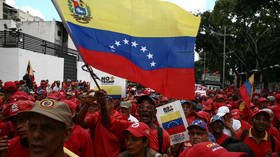Venezuela’s overtures to US will be ignored, as Washington persists with sanctions that violate the rights they claim to uphold

US-led sanctions against the government of Venezuelan President Nicolas Maduro are illegal, politicized weapons that have caused a humanitarian crisis. And there will be no let-up from America until there is regime change.
Embattled Venezuelan President Nicolas Maduro recently transferred six former executives of United States oil refiner Citgo from jail to house arrest, having earlier agreed to let the United Nations’ World Food Program (WFP) enter the country.
His decisions come amid a humanitarian crisis sparked by punitive trade sanctions on his regime imposed mainly by the US but also by the United Kingdom and the European Union.
To the Biden administration, which has taken over a destructive, highly politicized sanctions regime from Donald Trump, the vice on Venezuela is in no way to be loosened in light of Maduro’s overtures. Citgo is a US subsidiary of Venezuelan state oil company PDVSA, and had been a crucial means for Caracas to raise cash from selling barrels of its vast oil reserves – the world’s largest – before a round of Trump sanctions locked Maduro out of Citgo’s bank accounts and their $7 billion in 2019.
Also on rt.com New US admin stands for same grotesque & brutal policies against Venezuela, shows just how little they actually CARE for peopleBut this immensely important context – that a beleaguered regime has been punished for doing exactly what it ought to have done in attempting to sell its way out of economic encirclement – is flippantly ignored by the foreign policy elite in Washington. To them, Maduro’s overtures are meaningless because they do not destroy Venezuela’s socialist government and do not pave the way for pro-Western regime change. The Maduro government is holding the ‘Citgo 6’ on charges of embezzlement, for which they were convicted in 2020. Yet only if such individuals and their accomplices were allowed to plunder the Maduro government’s resources without oversight would their backers in Washington be satisfied.
Euphemisms for this barefaced partisanship flowed freely in the administration’s reaction to Maduro’s ‘Citgo 6’ decision. “We are seeing that Maduro is sending signals but again we’re going to act based on really concrete actions,” according to one official, who dodged mention of the “concrete actions” that had already been committed by the convicted Citgo executives, when they illegally tried to use company assets to secure $4 billion in loans, or by the Trump administration, when it effectively stole Citgo’s holdings from PDVSA.
In remarks delivered at the Congress of the Americas on Tuesday, US Secretary of State Antony Blinken tried to deflect blame for the humanitarian crisis onto Maduro and stated, “We will continue to work with our partners across the region both to alleviate the suffering of the Venezuelan people and to exert pressure on the regime so the country can peacefully return to democracy.”
Exerting “pressure” on Maduro’s government so Venezuela can “return to democracy” has really meant ruining the economic livelihoods of the country’s people through harsh trade restrictions, all to foment anarchy leading to a replacement of the Maduro regime with one more subservient to Washington and its allies in London and Brussels. The US-led gambit for installing a pro-Western Venezuelan regime rests on support for Juan Guaido, an opportunist usurper who, unlike Maduro, has never won a national presidential election. Washington’s barrage of sanctions has helped Guaido pilfer state money despite lacking any sovereign mandate to rule Venezuela. A Guaido-appointed board has taken ownership of the stolen Citgo capital, and his US and UK agents have seized 31 tons of Venezuelan government gold held at the Bank of England, with this theft being shielded from prosecution by the UK’s High Court.
Also on rt.com US is manufacturing a crisis in Venezuela so that there is chaos and 'needed' interventionOne-sided sanctions like those imposed by the US, chiefly targeting Venezuela’s $200 billion in government debt, its oil reserves, and PDVSA, are illegal under the international law of the UN.
Denounced by Maduro in front of the UN General Assembly in 2020 as “criminal, inhuman aggression,” they have caused so much damage in the country that Alena Douhan, a UN Special Rapporteur tasked with researching the sanctions inside Venezuela, has publicly condemned them. Two major reports originating in the US have also admitted the role of Western sanctions in bringing about Venezuela’s dire situation. One, released in 2019 and co-authored by economist Jeffrey Sachs, has blamed US trade restrictions for tens of thousands of Venezuelan deaths. The paper emphasizes the illegality of sanctions implemented for political ends, noting that the Organization of American States (OAS), of which both the US and Venezuela are members, declares in its Charter that “No State or group of States has the right to intervene, directly or indirectly, for any reason whatever, in the internal or external affairs of any other State. The foregoing principle prohibits not only armed force but also any other form of interference… against its political, economic, and cultural elements.”
The second major report, released on April 28 by the Congressional Research Service (CRS) – Capitol Hill’s own think tank – has been constrained to admit, however begrudgingly, that US trade sanctions have thrown Venezuela’s economy into disarray and exacerbated civil unrest. The report compiles recent research, including that in a Government Accountability Office (GAO) study indicating “[US] sanctions, particularly on the state oil company in 2019, likely contributed to the steeper decline of the Venezuelan economy.”
Even though economic hardships have led Maduro to default on bonds for Venezuela’s accumulated billions in government debt, “US sanctions prohibit debt restructuring with creditors.” Specifically, the CRS cites a 75% contraction in the national economy since 2014, a 95% reduction in consumer-goods imports since 2013 and rampant food and medicine shortages as precipitated by the 2014 fall in oil prices – but worsened and extended by targeted US sanctions that nullified every single Maduro-government effort to curtail the crisis, including price controls, an oil-based digital currency called the petro, and attempted restructuring of the country’s enormous debt. So-called “secondary sanctions” which have “prohibited non-US entities from transacting with PDVSA” have severely complicated Chinese and Russian efforts to extend additional credit and goods to their Venezuelan ally.
Also on rt.com ‘Cyberattacks & insider sabotage’: Venezuela’s power grid still under attack – MaduroThis sustained, coercive embargoing of Venezuela’s oil sector “likely contributed to a fall in oil production, such that even as global oil prices rebounded, Venezuela’s economy did not recover.”
Chopping off Venezuela’s main foundation for economic recovery – its ability to leverage massive national oil wealth – is designed to undermine the government led by Maduro, otherwise the US and its allies would not be demanding Caracas honor its debt while they simultaneously increase that debt via the effects of wide-ranging sanctions. The CRS report’s apparent reason for cataloguing the sanctions’ humanitarian harm is to induce Maduro to surrender to full-on debt slavery dictated by the US-based International Monetary Fund (IMF) in which the US is the largest funder, in a restructuring program that would send consumer prices skyrocketing and make the national economy prey to international bankers. These sweeping changes are presented not as imperialist demands but as polite suggestions riven with pleasant-sounding generalities: “an IMF program that could unlock broader international assistance” is inferred as “a significant reorientation of economic policies” that is the only solution to the country’s problems.
Yet US sanctions have stifled the Venezuelan government’s more-promising means of solving those problems before the means could be fully and freely implemented.
The report’s authors briefly concede that Maduro’s United Socialist Party predecessor Hugo Chavez successfully used Venezuelan oil wealth to reduce the country’s poverty rate by 20%. Maduro, shortly after taking office, instituted a broad poverty-reduction program in 2014 focused on food provision and efficient access to medical care. US sanctions which hit his country soon after impeded this and all other programs attempting social reform and economic autonomy.
Also on rt.com US sanctions on Venezuela have failed to achieve anything but needless death and misery. Against all reason, they are set to stayBut the Maduro government has been diligent in carrying out humanitarian-relief efforts in the face of sanctions that have made such efforts almost impossible. Not only has the Venezuelan president approved a deal with the WFP to provide 1.5 million meals for children; he has also brought the Russian Sputnik and Chinese Sinopharm vaccines into the country to address Covid-19 and, after a lengthy delay caused by the US freezing Venezuelan assets abroad, put together $64 million to join the UN’s COVAX vaccine program.
Ending the sanctions and resolving Venezuela’s crisis amicably would have less justification if Caracas were behaving as a rapacious creditor abroad. But it is not. Not only is it trying time and again to protect its sovereign assets from the repeated thefts of its enemies, dating back to the time of Chavez it forgave $295 million of Haiti’s debt following the Haitian earthquake of 2010.
This generosity took place under Venezuela’s PetroCaribe system, whereby a group of Caribbean countries receive loans of Venezuelan crude oil, in return for paying the purchase price over an extended period with an interest rate of 1% per year.
This trade program of economic assistance, continuing under Maduro, presents a stark contrast against the Western politicized sanctions regime. Depoliticized trade fosters links of economic interdependence, whereas politically motivated sanctions lead to isolation and anarchy. In Washington’s warped view, however, the terrors caused by sanctions are the fruits of “democracy.”
Like this story? Share it with a friend!
The statements, views and opinions expressed in this column are solely those of the author and do not necessarily represent those of RT.













